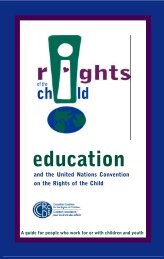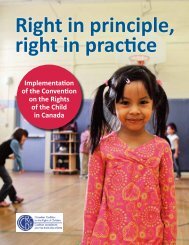Poste - Canadian Coalition for the Rights of Children
Poste - Canadian Coalition for the Rights of Children
Poste - Canadian Coalition for the Rights of Children
Create successful ePaper yourself
Turn your PDF publications into a flip-book with our unique Google optimized e-Paper software.
Nova Scotia:<br />
• As part <strong>of</strong> <strong>the</strong> citizenship areas <strong>of</strong> learning,<br />
graduates will be able to assess environmental<br />
interdependence in a local and global context. In<br />
order to graduate from high school, students<br />
must complete one credit in global studies,<br />
global geography or global history.<br />
• Studies in biology in Grades 11 and 12 educates<br />
students about <strong>the</strong> nature <strong>of</strong> science and<br />
technology so that <strong>the</strong>y know about <strong>the</strong><br />
significant impact <strong>of</strong> biology and associated<br />
technology on society but also <strong>the</strong> limitations. In<br />
addition, a course in oceanography is <strong>of</strong>fered as<br />
an integrated approach to science. 153<br />
Ontario:<br />
• The new science and technology curriculum,<br />
introduced in 1998, has a Life Systems strand <strong>for</strong><br />
Grades 1 through 7, which includes examination<br />
<strong>of</strong> <strong>the</strong> characteristics <strong>of</strong> living things, growth and<br />
change in animals and plants, habitat and<br />
communities, ecosystems, and <strong>the</strong> effects <strong>of</strong><br />
human activities and technological<br />
innovations. 154<br />
• Grades 7 and 8 geography encourages students<br />
to examine: <strong>the</strong> various ways in which resources<br />
are used, <strong>the</strong> impact technology has on natural<br />
resources, and sustainable development. 155<br />
Quebec:<br />
• The redefined 1997 educational policy includes<br />
an emphasis on environmental education. 156<br />
• Consumer studies address <strong>the</strong> repercussions <strong>of</strong><br />
individual consumption and participation in<br />
improving <strong>the</strong> environment. 157<br />
Saskatchewan:<br />
• The natural environment is addressed<br />
throughout <strong>the</strong> curriculum, from social studies to<br />
biology. 158 Science study from Grades 1 to 10<br />
includes examination <strong>of</strong> animals, plants, food<br />
chains, human impact on <strong>the</strong> environment,<br />
ecosystems, populations, essential characteristics<br />
<strong>of</strong> life, ecological regions <strong>of</strong> Saskatchewan, water<br />
quality and <strong>the</strong> greenhouse effect. 159<br />
H O W D O E S C A N A D A M E A S U R E U P ?<br />
91<br />
Parental Involvement and<br />
Alternative Forms <strong>of</strong> Education<br />
Role <strong>of</strong> Parents<br />
The role <strong>of</strong> parents in <strong>the</strong>ir children’s education is becoming<br />
increasingly important in Canada. For example, Manitoba<br />
organizes annual <strong>for</strong>ums <strong>for</strong> parents to examine how<br />
curriculum is developed160 and Alberta allows parents to<br />
choose where <strong>the</strong>ir children will be educated within <strong>the</strong><br />
Edmonton public school system. 161 Parental input has been<br />
implemented with <strong>the</strong> establishment <strong>of</strong> school councils. For<br />
example, Yukon school councils include parental and<br />
Aboriginal representation and are responsible <strong>for</strong> many<br />
personnel, programming and administrative matters. 162<br />
In Ontario, an 18-person Ontario Parent Council was<br />
introduced in 1993, mandated in part to oversee <strong>the</strong> role<br />
<strong>of</strong> parent councils at <strong>the</strong> school level. 163<br />
While <strong>the</strong>re is general agreement about <strong>the</strong> desirability <strong>of</strong><br />
greater parental involvement, <strong>the</strong>re is some concern with <strong>the</strong><br />
trend to decrease <strong>the</strong> power <strong>of</strong> school boards and increase <strong>the</strong><br />
role <strong>of</strong> parent school councils. School councils’ influence is<br />
affected by <strong>the</strong> attitudes and support <strong>of</strong> principals and board<br />
<strong>of</strong>ficials and <strong>the</strong> expertise and commitment <strong>of</strong> council<br />
members. 164 Research on school councils in Newfoundland,<br />
Alberta and Ontario identified a strong need <strong>for</strong> training and<br />
support. 165 It is unknown whe<strong>the</strong>r governments will invest in<br />
<strong>the</strong> required training and support to develop <strong>the</strong>se bodies. 166<br />
In <strong>the</strong> 1992 <strong>Canadian</strong> Education Association survey about<br />
Aboriginal education, almost two-thirds <strong>of</strong> <strong>the</strong> sample (290/<br />
458 schools or 63.3 percent) did not respond to <strong>the</strong> question<br />
about <strong>the</strong> need <strong>for</strong> parental and community involvement.<br />
This may indicate that most Aboriginal parents are not<br />
participating in <strong>the</strong> education process. However, <strong>the</strong><br />
remaining 168 schools in <strong>the</strong> survey described a variety<br />
<strong>of</strong> ways parents can become involved, such as tribal/<br />
community-school liaison, parental advisory committees,<br />
volunteer programs, local school board representation and<br />
regular parent-teacher meetings. 167<br />
Alternatives to Public Schools<br />
Education legislation allows <strong>for</strong> alternatives to public<br />
schools, such as home schooling, independent schooling<br />
or charter schooling.<br />
Home Schooling<br />
Home-based education is legal if parents provide<br />
“satisfactory” or “equivalent” instruction. The <strong>Canadian</strong>




